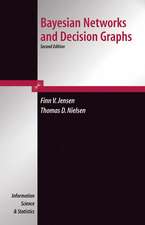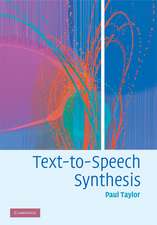Evolution of Semantic Systems
Editat de Bernd-Olaf Küppers, Udo Hahn, Stefan Artmannen Limba Engleză Paperback – 20 mai 2015
With the aim of fostering a better understanding of semantic systems from an evolutionary and multidisciplinary perspective, this volume collects contributions by philosophers and natural scientists, linguists, information and computer scientists. They do not follow a single research paradigm; rather they shed, in a complementary way, new light upon some of the most important aspects of the evolution of semantic systems.
Evolution of Semantic Systems is intended for researchers in philosophy, computer science, and the natural sciences who work on the analysis or development of semantic systems, ontologies, or similar complex information structures. In the eleven chapters, they will find a broad discussion of topics ranging from underlying universal principles to representation and processing aspects to paradigmatic examples.
| Toate formatele și edițiile | Preț | Express |
|---|---|---|
| Paperback (1) | 642.98 lei 6-8 săpt. | |
| Springer Berlin, Heidelberg – 20 mai 2015 | 642.98 lei 6-8 săpt. | |
| Hardback (1) | 649.28 lei 6-8 săpt. | |
| Springer Berlin, Heidelberg – 19 apr 2013 | 649.28 lei 6-8 săpt. |
Preț: 642.98 lei
Preț vechi: 803.72 lei
-20% Nou
Puncte Express: 964
Preț estimativ în valută:
123.03€ • 128.46$ • 101.83£
123.03€ • 128.46$ • 101.83£
Carte tipărită la comandă
Livrare economică 04-18 aprilie
Preluare comenzi: 021 569.72.76
Specificații
ISBN-13: 9783642434426
ISBN-10: 3642434428
Pagini: 232
Ilustrații: XII, 232 p.
Dimensiuni: 155 x 235 x 13 mm
Greutate: 0.35 kg
Ediția:2013
Editura: Springer Berlin, Heidelberg
Colecția Springer
Locul publicării:Berlin, Heidelberg, Germany
ISBN-10: 3642434428
Pagini: 232
Ilustrații: XII, 232 p.
Dimensiuni: 155 x 235 x 13 mm
Greutate: 0.35 kg
Ediția:2013
Editura: Springer Berlin, Heidelberg
Colecția Springer
Locul publicării:Berlin, Heidelberg, Germany
Cuprins
The Emergence of Reference.- Pragmatism and the Evolution of Semantic Systems.- System Surfaces - There Is Never Just Only One Structure.- Elements of a Semantic Code.- Talking about Structures.- Toward a Theory of Information Structure.- Mechanics and Mental Change.- Semantic Technologies: A Computational Paradigm for Making Sense of Informal Meaning Structures.- What are Ontologies good for?.- Taxonomic Change as a Reflection of Progress in a Scientific Discipline.- Crystallization as a Form of Scientific Semantic Change: The Case of Thermodynamics.
Notă biografică
Bernd-Olaf Küppers is a professor emeritus of Natural Philosophy at the University of Jena. From 2008-2012 he was also the founding director of the Frege Centre for Structural Sciences at the same university. Prior to this he worked at the Max Planck Institute for Biophysical Chemistry in Göttingen (1971-1993). His scientific interests cover a wide range of problems that are centred on the fundamental question of the origin and evolution of life.
Udo Hahn is a professor of Computational Linguistics at the University of Jena and since October 2012 he is the director of the Frege Centre for Structural Sciences. His research interests include natural language processing (NLP), text analytics, information retrieval, knowledge representation, machine learning for NLP, and ontology design and engineering.
Stefan Artmann, a philosopher of science and technology, is currently working as Senior Scientific Coordinator at the Presidential Office, German National Academy of Sciences Leopoldina. He is teaching at the Institute of Philosophy, University of Jena, and is an associate member of the Frege Centre for Structural Sciences.
Udo Hahn is a professor of Computational Linguistics at the University of Jena and since October 2012 he is the director of the Frege Centre for Structural Sciences. His research interests include natural language processing (NLP), text analytics, information retrieval, knowledge representation, machine learning for NLP, and ontology design and engineering.
Stefan Artmann, a philosopher of science and technology, is currently working as Senior Scientific Coordinator at the Presidential Office, German National Academy of Sciences Leopoldina. He is teaching at the Institute of Philosophy, University of Jena, and is an associate member of the Frege Centre for Structural Sciences.
Textul de pe ultima copertă
Complex systems in nature and society make use of information for the development of their internal organization and the control of their functional mechanisms. Alongside technical aspects of storing, transmitting and processing information, the various semantic aspects of information, such as meaning, sense, reference and function, play a decisive part in the analysis of such systems.
With the aim of fostering a better understanding of semantic systems from an evolutionary and multidisciplinary perspective, this volume collects contributions by philosophers and natural scientists, linguists, information and computer scientists. They do not follow a single research paradigm; rather they shed, in a complementary way, new light upon some of the most important aspects of the evolution of semantic systems.
Evolution of Semantic Systems is intended for researchers in philosophy, computer science, and the natural sciences who work on the analysis or development of semantic systems, ontologies, or similar complex information structures. In the eleven chapters, they will find a broad discussion of topics ranging from underlying universal principles to representation and processing aspects to paradigmatic examples.
With the aim of fostering a better understanding of semantic systems from an evolutionary and multidisciplinary perspective, this volume collects contributions by philosophers and natural scientists, linguists, information and computer scientists. They do not follow a single research paradigm; rather they shed, in a complementary way, new light upon some of the most important aspects of the evolution of semantic systems.
Evolution of Semantic Systems is intended for researchers in philosophy, computer science, and the natural sciences who work on the analysis or development of semantic systems, ontologies, or similar complex information structures. In the eleven chapters, they will find a broad discussion of topics ranging from underlying universal principles to representation and processing aspects to paradigmatic examples.
Caracteristici
Presents a multidisciplinary perspective on semantic systems and information processing Discusses topics ranging from underlying universal principles to paradigmatic examples Combines presentations by leading researchers from the fields of philosophy, computer science, and the natural sciences Includes supplementary material: sn.pub/extras
















